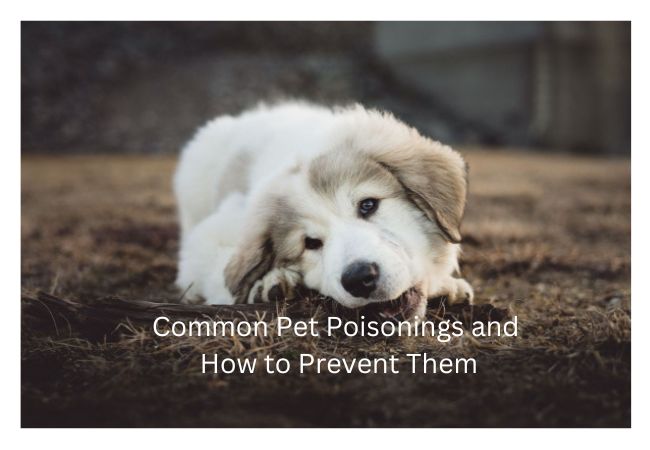
Common Pet Poisonings and How to Prevent Them
Pets are beloved members of many families, and keeping them safe and healthy is important. Unfortunately, pets can be accidentally poisoned by a variety of substances, some of which are commonly found in homes and yards. You can protect your furry friend from harm by understanding the most common types of pet poisoning and how to prevent them.
Household Cleaners and Chemicals
Household cleaners and chemicals can be extremely toxic to pets if ingested or inhaled. Some common examples include bleach, laundry detergent, dish soap, and pesticides. These substances can cause serious harm to a pet's digestive and respiratory systems and can even be fatal in large doses.
To prevent poisoning from household cleaners and chemicals, it is important to keep these substances out of reach of pets. This means storing them in a locked cabinet or on a high shelf that your pet cannot access. You should also be careful when using these substances and avoid using them when your pet is in the room. If you suspect that your pet has been poisoned by a household cleaner or chemical, contact your vet immediately.
Medications
Medications can be very dangerous for pets if not used properly. Many human medications, such as painkillers and antidepressants, can be toxic to pets. Even over-the-counter medications, such as ibuprofen and acetaminophen, can be fatal to pets in high doses.
To prevent poisoning from medications, it is important to keep all medicines out of reach of pets. This means storing them in a locked cabinet or on a high shelf that your pet cannot access. You should also be careful when taking your own medications and avoid leaving pills or capsules on the counter or table where your pet can reach them. Contact your vet immediately if you suspect your pet has been poisoned by medication.
Plants
Many common houseplants and outdoor plants can be toxic to pets if ingested. Some examples include lilies, daffodils, and rhododendrons. These plants can cause serious harm to a pet's digestive system and can even be fatal in some cases.
To prevent poisoning from plants, it is important to be aware of which plants are toxic to pets and to keep these plants out of reach of your furry friend. Contact your vet immediately if you suspect your pet has ingested a toxic plant.
Foods
Certain human foods can be toxic to pets and should be avoided. Some examples include chocolate, grapes, and onions. These foods can cause serious harm to a pet's digestive system and can even be fatal in some cases.
In some cases, pets intake food leftover outside the house. Make sure to install safety devices to restrict the unguarded movement of the pets. You can browse and then buy a wide range of advanced safety products from the Petstop home page.
To prevent poisoning from foods, it is important to be aware of which foods are toxic to pets and to keep these foods out of reach of your furry friend. You should also be careful when preparing meals and avoid leaving foods that are toxic to pets on counters or tables where your pet can reach them. If you suspect that your pet has been poisoned by a food, contact your vet immediately.
Alcohol
Alcohol can be very dangerous for pets and should be avoided. Even small amounts of alcohol can cause serious harm to a pet's nervous system and can even be fatal in some cases.
To prevent poisoning from alcohol, it is important to keep all alcohol out of reach of pets. This means storing it in a locked cabinet or on a high shelf that your pet cannot access. You should also be careful when drinking alcohol around your pet and avoid leaving drinks or bottles where your pet can reach them. If you suspect that your pet has been poisoned by alcohol, contact your vet immediately.
Other Poisons
Many other types of poisons, such as antifreeze, rodenticides, and even certain types of human cosmetics, can be dangerous to pets. It is important to be aware of these hazards and to take steps to prevent your pet from coming into contact with them.
Preventing Poisoning in Pets
One of the best ways to prevent poisoning in pets is to be aware of the hazards in your home and yard. This means being mindful of the types of substances and plants that are toxic to pets and being aware of other hazards such as medications, alcohol, and chemicals.
Another important step in preventing poisoning in pets is to keep these hazards out of reach of your furry friend. This means storing toxic substances and plants in locked cabinets or on high shelves and being careful when using medications or chemicals around your pet.
It is also important to be aware of the signs of poisoning in pets so that you can take action quickly if you suspect your pet has been exposed to a toxic substance. Some common signs of poisoning include vomiting, diarrhoea, tremors, seizures, and difficulty breathing. If you notice these symptoms in your pet, contact your vet immediately.
In conclusion, poisoning is a serious issue for pets, and it is important to take steps to prevent it. By understanding the most common types of poisonings and how to prevent them, you can keep your furry friend safe and healthy.
Always be aware of the hazards that are present in your home and yard, keep these hazards out of reach of your pet and always be aware of the signs of poisoning so that you can take action quickly if you suspect that your pet has been exposed to a toxic substance.

Comments (0)